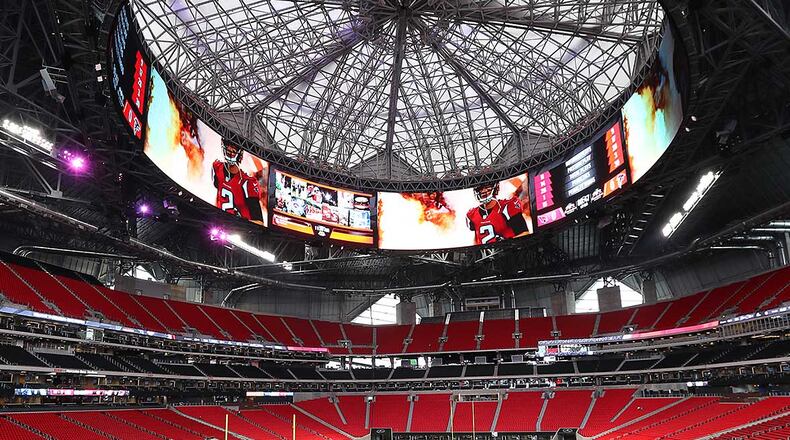Compared with many of the events already booked for Mercedes-Benz Stadium, the first one is pretty tame: an NFL exhibition game Saturday night.
The Atlanta Falcons will open the $1.5 billion downtown stadium – in the works for about a decade and under construction for 3 ½ years – with what is essentially a practice against the Arizona Cardinals.
The game isn’t the main attraction this time. The stadium is.
“We think we have built the finest sports-and-entertainment complex in the United States today,” Falcons owner Arthur Blank said.
Much bigger events are headed there soon.
On Sept. 2, for the stadium's first nationally televised showcase, two college-football powerhouses – No. 1-ranked Alabama and No. 3 Florida State — will meet in what has been branded the best season-opening matchup in the sport's history. That will be followed by a Georgia Tech-Tennessee football game Sept. 4, the stadium's first Atlanta United soccer match Sept. 10 and the Falcons' regular-season home opener against the Green Bay Packers on Sept. 17.
But bigger than any of that, the stadium already has landed three mega-events over the next three years: the College Football Playoff national championship game Jan. 8, the Super Bowl in February 2019 and the college basketball Final Four in April 2020.
“We’re going to go through a run here similar to when we first got the Georgia Dome and had the (1994) Super Bowl, (1996) Olympics and (2002) Final Four, but it’s going to be more compact,” said Gary Stokan, president of Peach Bowl Inc. and former president of the Atlanta Sports Council.
“This facility is state-of-the-art, world-class,” Stokan said, “and everybody is going to want to participate in it, play in it.”
So far, the stadium has landed all three mega-events it has pursued, despite the bids having been made while the building was in the early stages of construction.
“I don’t know that we ever thought we would get all three of those events right out of the box and back-to-back-to-back,” Falcons President and CEO Rich McKay said. “But I think the architecture of the building and where we are as a city just led itself to that.”
The stadium also secured a 10-year commitment to host the SEC Championship football game, which had been played in the Georgia Dome since 1994.
Luring marquee events was part of the pitch for partially funding the stadium with taxpayer dollars. Some $200 million from bonds backed by Atlanta hotel-motel tax revenue went toward construction, and hundreds of millions of additional dollars from the same tax will go toward the stadium over the next 30 years.
The amount of the total public contribution depends on how much tax is collected because 39.3 percent of annual collections from a 7-cents-per-dollar tax on hotel rooms will be directed to the stadium for debt service, capital improvements, operations and maintenance. Over 30 years, the total likely will top $700 million.
The stadium’s predecessor made Atlanta a magnet for big sports events. The Georgia Dome hosted two Super Bowls, the most recent in 2000, before the NFL decided a new stadium would be required for Atlanta to get another one. The Dome hosted three Final Fours, the most recent in 2013, and might have been awarded another if not for the decision to replace the facility.
Saturday’s opening of Mercedes-Benz Stadium will cap a challenging process that unofficially began in September 2006, when Blank predicted in an interview with The Atlanta Journal-Constitution that the Falcons would have a new stadium in a decade or so.
The Georgia Legislature got the ball rolling in 2010 by authorizing an extension of Atlanta’s hotel-motel tax for a new or renovated stadium on the Georgia World Congress Center campus. Formal negotiations between the Falcons and the GWCCA began in 2011.
Plans eventually shifted from an open-air stadium to a retractable-roof stadium, from a site about a half-mile north of the Georgia Dome to a site about 80 feet south of the Dome and from the state issuing the bonds for the public portion of the construction cost to the city issuing them.
The deal was approved by the Atlanta City Council in March 2013. Two churches were purchased and demolished. Construction began in early 2014.
The cost rose from an initial estimate of $1 billion to $1.2 billion to $1.4 billion to $1.5 billion. The scheduled completion date was pushed back three times because of issues with steel work related to the roof.
Now, finally, the stadium opens, albeit with the roof closed because it is not yet fully mechanized. The Falcons have said they expect to play with the roof open at some point this season.
“When we ran into roadblocks, (Blank) never wavered,” said Bill Johnson, the stadium’s lead architect. “He was always, ‘We’re going to do this. It’s harder than we thought, and it costs more than we thought, but we’re committed to getting it done and doing it right.’”
Blank said he expects 1 million people to attend events in the stadium in its first 60 days. College football's national championship game is less than 4 1/2 months away.
“I have a favorite expression that says there is no finish line,” Blank said. “You might say, ‘Well, gosh, the stadium is finished, so there is a finish line.’ But actually this is the beginning for us. The incredible design and construction … brings us to the first game of our stadium life.”
The first kickoff is set for 7:06 p.m.
About the Author
Keep Reading
The Latest
Featured



